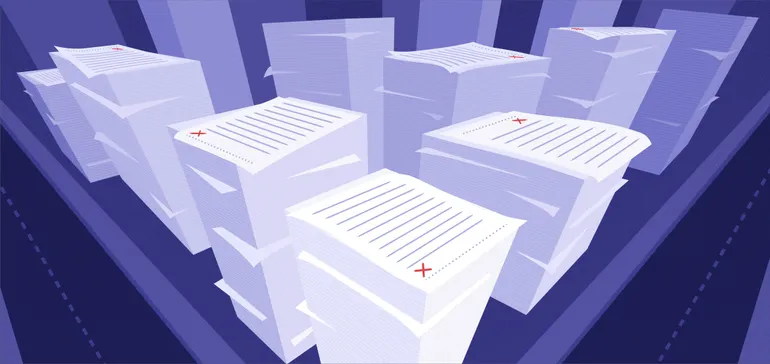This feature is a part of “The Dotted Line” series, which takes an in-depth look at the complex legal landscape of the construction industry. To view the entire series, click here.
When the government shuts down, contractors’ cash flow on federal sites does too.
The federal government shut down on Oct. 1, freezing activity on a number of construction sites. Attorneys say these shutdowns double as a stress test for how well construction firms document and negotiate their federal contracts.
During funding lapses, even short ones, the line between work continuation and work stoppage blurs. For some firms, that can mean weeks on site that go unpaid. For others, it’s a crash course in which clauses actually protect them when government operations grind to a halt.
Unclear funding
The most common surprise during a shutdown comes when contractors realize their agreements do not guarantee payment for work already performed, or that they must keep working anyway, said Zack Rippeon, partner in the Atlanta office of Adams & Reese.
Zack Rippeon
Courtesy of Adams & Reese
“Some may discover, for the first time, that they’re required to continue working even if they don’t get paid timely,” Rippeon told Construction Dive. “That discovery may require them to finance some, or all, of the work for extended time periods.”
If a project’s funding was appropriated before the fiscal year began, work can usually continue, albeit with slower payment cycles. But if funds were not secured before the cutoff, “it will go dark for the foreseeable future because no funds are available during the shutdown,” said Rippeon.
That uncertainty often extends to subcontractors too. Contractors who fail to flow down stop-work or suspension clauses to their subs risk being squeezed between the government and their project partners, said Michael Barnicle, partner at Atlanta-based Troutman Pepper Locke.
“Also, don’t presume there is a one-size-fits-all answer every contract because there are a variety of exceptions that may apply to certain contracts,” Barnicle added.
A documentation playbook
If a contractor’s government contact is already furloughed, firms must still provide written notice of any work freezes or cost increases, said Aron Beezley, partner at Birmingham, Alabama-based Bradley Arant Boult Cummings.

Aron Beezley
Courtesy of Bradley Arant Boult Cummings
“Government contractors should keep contemporaneous records of all communications, costs, delays and idle time,” Beezley told Construction Dive. “Contractors should also provide timely written notices to contracting officers under the contract’s changes or stop-work clauses.”
Tracking costs separately is critical, added Scott Damiecki, construction industry practice leader at CohnReznick.
“[Contractors should] stay in regular communication with the contracting officer and request written orders for stop-work or suspension of project,” Damiecki told Construction Dive. “Track all costs related to the shutdown such as demobilization, remobilization, idle time, storage, etc., as separate cost codes so you can quantify the impact.”
Proper documentation also extends downstream.

Scott Damiecki
Courtesy of CohnReznick
“Provide proper notice to subcontractors to protect your own interest and preserve their rights,” said Damiecki. “Maintain detailed records of specific disruptions such as delays and stop-work orders. This should include information on the impact to employees which may include furloughs and layoffs.”
Navigate gray areas
Shutdowns often create confusion about whether work must continue, especially for partially funded projects. The result is a gray area where contractors fear both stopping and proceeding.
“The biggest vulnerability for government contractors is unclear funding and stop-work authority,” Beezley told Construction Dive. “Government contractors often lack definitive guidance on whether work can continue, or costs are reimbursable.”
Some contracts require continued performance regardless of payment status. That can force firms to self-finance operations until appropriations resume. Those without clarity risk disputes later, especially if subcontract agreements don’t flow down.
“For example, does the subcontract allow the contractor to demand the subcontractor continue performing, or provide for work stoppages or delayed payments?” Rippeon said. “And what damages are the subcontractors entitled to that the contractor may not be entitled to in such events?”
The long tail of a shutdown
Even after the government reopens, effects may last months, said Damiecki.
“Payments on contracts could be delayed once the government reopens,” Damiecki told Construction Dive. “Contractors may need to recover additional costs incurred via a change order or request for an equitable adjustment or claim.”
Barnicle added the administrative backlog will be one of the biggest pain points.
“Everything will be delayed by months,” Barnicle told Construction Dive. “Contractors need to be aware how this may impact their cash flow.”
Rippeon agreed resuming construction operations will take time. Shutdowns also complicate workforce management, he added.
“Working through the impacts, both time and cost, of the shutdown will not happen quickly after the government reopens. The paperwork and bureaucratic red tape will take time to process,” Rippeon said. “And if the project was stopped or suspended, where did the workers go and how quickly can they return?”
What matters most
These clauses and their flow downs are most important, lawyers say:
- Stop-work clauses.
- Terminations for convenience.
- Change clauses.
- Equitable adjustment.
- Limitation of funds clauses.
“Contractors working directly for a government agency should check for provisions allowing for work stoppages or suspensions upon written notice with corresponding cost and time recovery mechanisms,” Rippeon told Construction Dive. “Those provisions should match what contractors put in their subcontract agreements to ensure contractors aren’t stuck in the middle between the government owner and its downstream subcontractors and suppliers.”
Since these clauses are often non-negotiable in prime contracts, the only real control firms have is how they flow them down. That will be important to avoid commercial claims, said Barnicle.
Disputes and preparation
Every shutdown triggers a wave of claims, said Damiecki.
“Anytime a shutdown occurs, there are typically more contractor disputes and claims,” Damiecki told Construction Dive. “Companies should keep detailed records related to the shutdown, provide timely notifications, review contract clauses, track costs and be ready to file claims to recover costs.”
Rippeon added dispute deadlines remain active even during a government shutdown.
“Note that any pending claims may still be subject to statutory deadlines that are not tolled due to the shutdown,” said Rippeon. “So, be sure to continue tracking appeal deadlines.”
Nevertheless, attorneys maintain the best mitigation though is preparation, not litigation.
“We expect to see more disputes, especially over delay and cost recovery,” Beezley told Construction Dive. “Government contractors can mitigate risk by improving documentation, updating shutdown contingency plans, negotiating clearer shutdown-related terms now, and consulting with experienced government contracts counsel.”

Michael Barnicle
Courtesy of Troutman Pepper Locke
Although prior shutdowns have created a body of legal precedent, contractors should not assume that means easy victories, added Barnicle.
“The good news is that the legal precedent is far more robust than previous shutdowns that provide contractors more predictability,” Barnicle told Construction Dive. “The bad news is that the legal precedent generally reveals shutdown related claims are difficult to win for contractors.”
View the original article and our Inspiration here


Leave a Reply